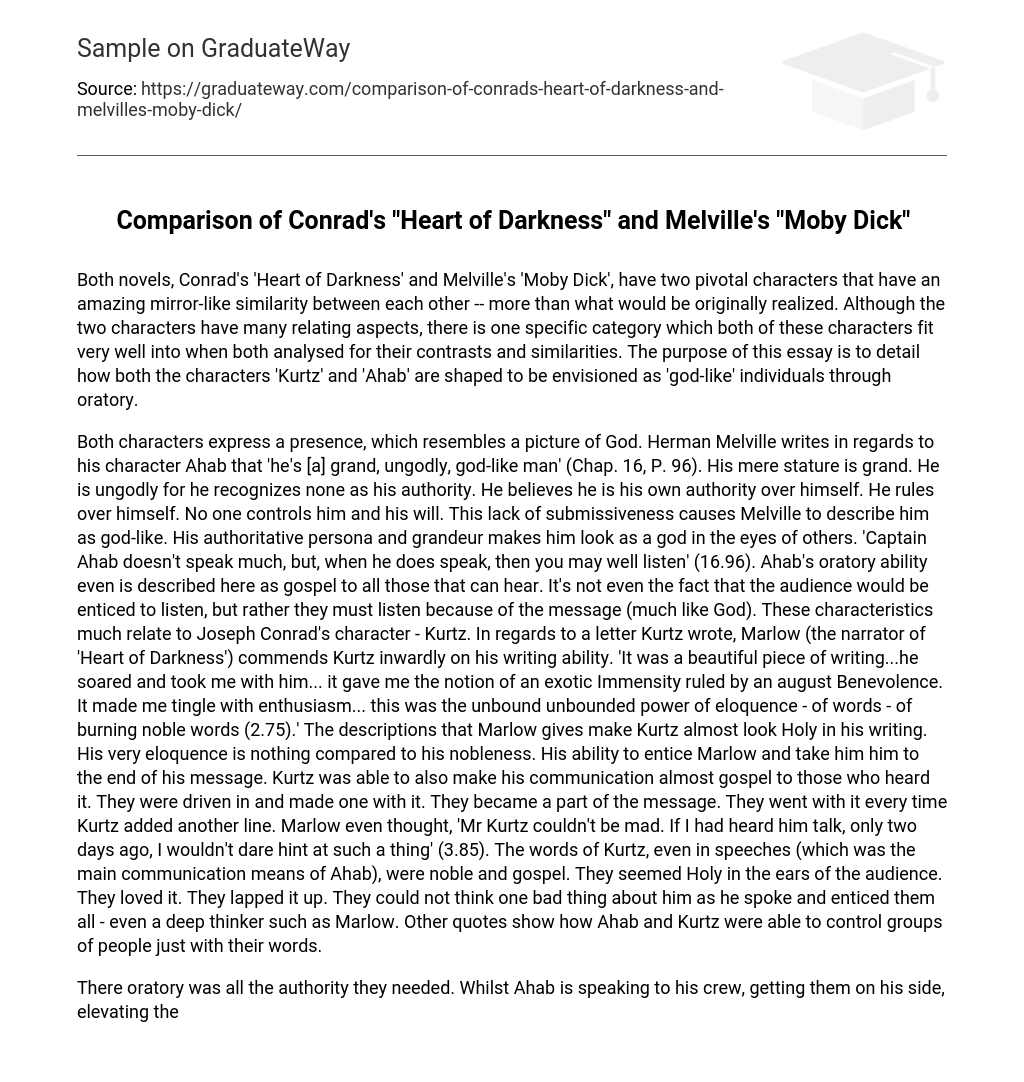Both novels, Conrad’s ‘Heart of Darkness’ and Melville’s ‘Moby Dick’, have two pivotal characters that have an amazing mirror-like similarity between each other — more than what would be originally realized. Although the two characters have many relating aspects, there is one specific category which both of these characters fit very well into when both analysed for their contrasts and similarities. The purpose of this essay is to detail how both the characters ‘Kurtz’ and ‘Ahab’ are shaped to be envisioned as ‘god-like’ individuals through oratory.
Both characters express a presence, which resembles a picture of God. Herman Melville writes in regards to his character Ahab that ‘he’s [a] grand, ungodly, god-like man’ (Chap. 16, P. 96). His mere stature is grand. He is ungodly for he recognizes none as his authority. He believes he is his own authority over himself. He rules over himself. No one controls him and his will. This lack of submissiveness causes Melville to describe him as god-like. His authoritative persona and grandeur makes him look as a god in the eyes of others. ‘Captain Ahab doesn’t speak much, but, when he does speak, then you may well listen’ (16.96). Ahab’s oratory ability even is described here as gospel to all those that can hear. It’s not even the fact that the audience would be enticed to listen, but rather they must listen because of the message (much like God). These characteristics much relate to Joseph Conrad’s character – Kurtz. In regards to a letter Kurtz wrote, Marlow (the narrator of ‘Heart of Darkness’) commends Kurtz inwardly on his writing ability. ‘It was a beautiful piece of writing…he soared and took me with him… it gave me the notion of an exotic Immensity ruled by an august Benevolence. It made me tingle with enthusiasm… this was the unbound unbounded power of eloquence – of words – of burning noble words (2.75).’ The descriptions that Marlow gives make Kurtz almost look Holy in his writing. His very eloquence is nothing compared to his nobleness. His ability to entice Marlow and take him him to the end of his message. Kurtz was able to also make his communication almost gospel to those who heard it. They were driven in and made one with it. They became a part of the message. They went with it every time Kurtz added another line. Marlow even thought, ‘Mr Kurtz couldn’t be mad. If I had heard him talk, only two days ago, I wouldn’t dare hint at such a thing’ (3.85). The words of Kurtz, even in speeches (which was the main communication means of Ahab), were noble and gospel. They seemed Holy in the ears of the audience. They loved it. They lapped it up. They could not think one bad thing about him as he spoke and enticed them all – even a deep thinker such as Marlow. Other quotes show how Ahab and Kurtz were able to control groups of people just with their words.
There oratory was all the authority they needed. Whilst Ahab is speaking to his crew, getting them on his side, elevating their spirits like never before to do something they never would have agreed to solely doing before, Ahab makes the point that ‘something shot from my dilated nostrils, he has inhaled it in his lungs. Starbuck now is mine’ (36.179). The one resisting Ahab, not fearing him, has now got no control. He longer has control over his own fate. The fate of the crew, and now Starbuck, is in the control of Ahab. He never enforced violence on Starbuck before this point. His words were merely enough to enforce such authority. Kurtz also used his words to enforce power, although he also did use violence to get his way. His words did captivate people however, as proven above. Both these men were powerful and awed because of their oratory ability. They were considered god-like because of this oratory ability. Both these characters were ‘god-like’ individuals through oratory.





